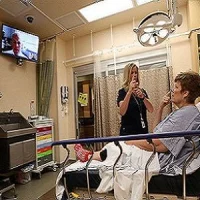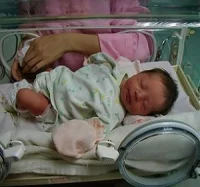New research shows that respiratory syncytial virus (RSV) can be detected from the clothes worn by caregivers/visitors who are visiting infants in the neonatal intensive care unit (NICU). The finding was presented at the International Conference on Emerging and Infectious Diseases in Atlanta, Georgia.
RSV is the leading cause of childhood respiratory hospitalisations amongst premature babies. "The aim of this study was to identify potential sources of transmission of RSV in the NICU to better inform infection control strategies," explains Dr. Nusrat Homaira, PhD researcher, from the University of New South Wales (UNSW) in Sydney, Australia.
Dr. Homaira conducted the study in the NICU of the Royal Hospital for Women in Sydney, Australia during peak community circulation of RSV. Once every week for two months, she and Joanne Sheils, a co-investigator, collected specimens from the hands, nose, and the clothes of the doctors, nurses and visitors in the NICU. A total of 4 percent of the swabs collected from the personal clothing of caregivers/visitors in the NICU had detectable RSV. In addition, RSV was detected from 9 percent of the high-touch areas in the NICU including computers on the nurse's table, chairs adjacent to the admitted infants and their bed rails.
"Though the detection rate is low, personal clothing of caregivers/visitors do get contaminated with RSV," Dr. Homaira points out. Caregivers and visitors are not required to change clothing when they walk into the NICU. "There is a need for further research to evaluate how long the virus remains infectious on personal clothing, which will have policy implications in terms of need for use of separate gowns by the visitors while they are in the NICU," she adds.
Although hands are the main mode of transmission for respiratory viruses, according to researchers, RSV was not detectable in the hands of the doctors, nurses or the visitors. There was alcohol based hand rub available at point of care and hand hygiene practices were prevalent within the NICU. Having optimal hand hygiene practices may mitigate the risk of respiratory infection within the NICU, the researchers note.
Frequent cleaning of high-touch areas and periodic screening of visitors for RSV as they enter into the NICU during period of annual seasonal epidemics might help in limiting the transmission of the disease within the NICU, the investigators conclude.
Source: American Society for Microbiology
Image credit: UNSW Australia
RSV is the leading cause of childhood respiratory hospitalisations amongst premature babies. "The aim of this study was to identify potential sources of transmission of RSV in the NICU to better inform infection control strategies," explains Dr. Nusrat Homaira, PhD researcher, from the University of New South Wales (UNSW) in Sydney, Australia.
Dr. Homaira conducted the study in the NICU of the Royal Hospital for Women in Sydney, Australia during peak community circulation of RSV. Once every week for two months, she and Joanne Sheils, a co-investigator, collected specimens from the hands, nose, and the clothes of the doctors, nurses and visitors in the NICU. A total of 4 percent of the swabs collected from the personal clothing of caregivers/visitors in the NICU had detectable RSV. In addition, RSV was detected from 9 percent of the high-touch areas in the NICU including computers on the nurse's table, chairs adjacent to the admitted infants and their bed rails.
"Though the detection rate is low, personal clothing of caregivers/visitors do get contaminated with RSV," Dr. Homaira points out. Caregivers and visitors are not required to change clothing when they walk into the NICU. "There is a need for further research to evaluate how long the virus remains infectious on personal clothing, which will have policy implications in terms of need for use of separate gowns by the visitors while they are in the NICU," she adds.
Although hands are the main mode of transmission for respiratory viruses, according to researchers, RSV was not detectable in the hands of the doctors, nurses or the visitors. There was alcohol based hand rub available at point of care and hand hygiene practices were prevalent within the NICU. Having optimal hand hygiene practices may mitigate the risk of respiratory infection within the NICU, the researchers note.
Frequent cleaning of high-touch areas and periodic screening of visitors for RSV as they enter into the NICU during period of annual seasonal epidemics might help in limiting the transmission of the disease within the NICU, the investigators conclude.
Source: American Society for Microbiology
Image credit: UNSW Australia
Latest Articles
healthmanagement, neonatal, intensive care unit, hand hygiene, infections, respiratory syncytial virus
New research shows that respiratory syncytial virus (RSV) can be detected from the clothes worn by caregivers/visitors who are visiting infants in the neonatal intensive care unit (NICU).










